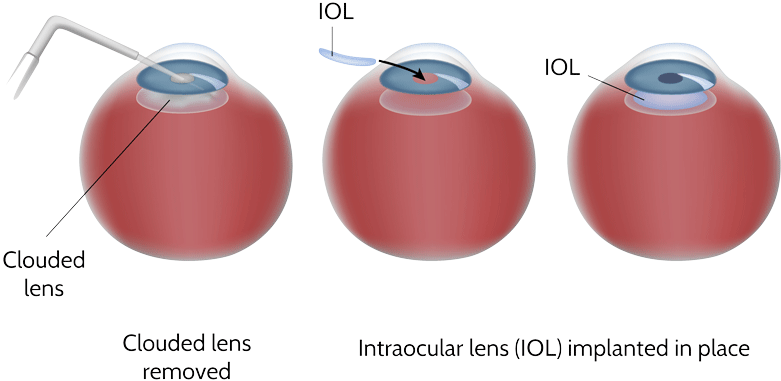Cataracts
Cataracts are the clouding of the natural lens in your eyes. They are very common as you age, although there are conditions such as diabetes, smoking, long-term UV exposure, and family genetics that can predispose you to have cataracts earlier.
As cataracts develop, they can cause blurry vision that may not be corrected with glasses. Common early signs of cataracts are difficulty driving at night due to glare or halos around lights, as well as increased difficulty with reading.
Cataract Surgery

Cataract surgery is our most frequent surgery performed at our surgery center and is one of the most common surgeries performed worldwide. During cataract surgery, the natural, cloudy lens is removed and an artificial lens implant is placed.
Prior to surgery, you and your surgeon will discuss your visual goals in order to decide which lens implant best suits your lifestyle. A standard lens implant allows you to focus primarily at one distance, either distance or near. With this lens, glasses may still be required to achieve your best visual potential.
Great Lakes Eye Care is pleased to offer state-of-the-art, advanced technology lenses. Toric lenses allow us to correct astigmatism and multifocal lenses, like the PanOptix or Vivity, allow you to focus at more than one distance.
The Light Adjustable Lens (LAL / LAL+) is the latest technology in lens options and is often considered the best option for those who desire the greatest potential to be without glasses. Unlike the other lens options that do not allow you to change your visual focal point after it is implanted, the Light Adjustable Lens can be adjusted using a clinic-based UV light source called a Light Delivery Device (LDD). This allows a patient to “test drive” their vision after cataract surgery, customizing it to their needs.
No matter which lens option you pursue, cataract surgery can dramatically improve your vision and can help make you less dependent on glasses or contacts. Discuss your lens options with our team to best match your lens to your visual goals and lifestyle needs.
Important Disclaimer: It is important to know that you have options regarding your lens choice. The choice is yours and typically depends on your expectations for dependency on glasses after surgery, cost and other ocular conditions. Insurance only pays for a standard lens (monofocal). The cost associated with advanced technology lens implants is a patient’s responsibility and is due before surgery.